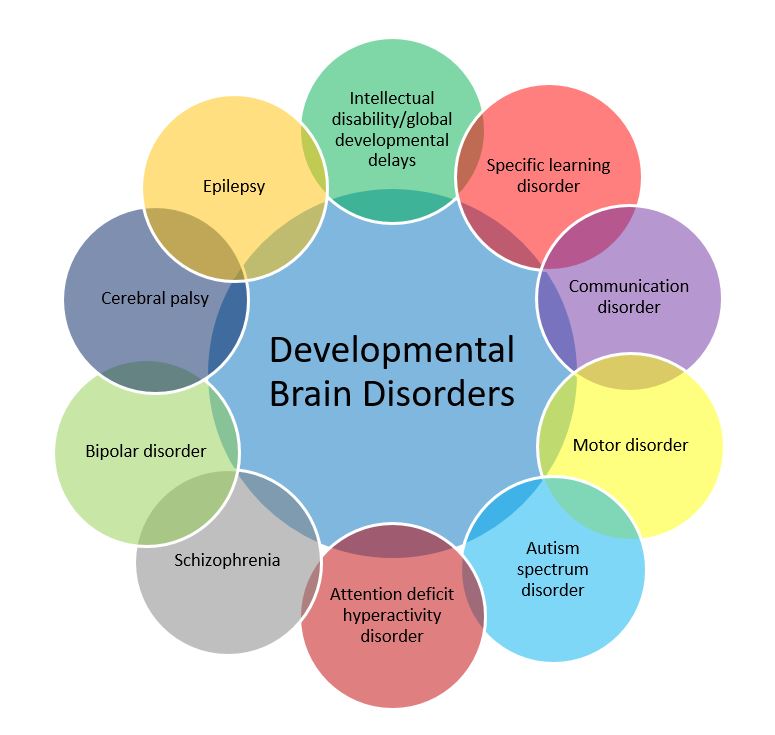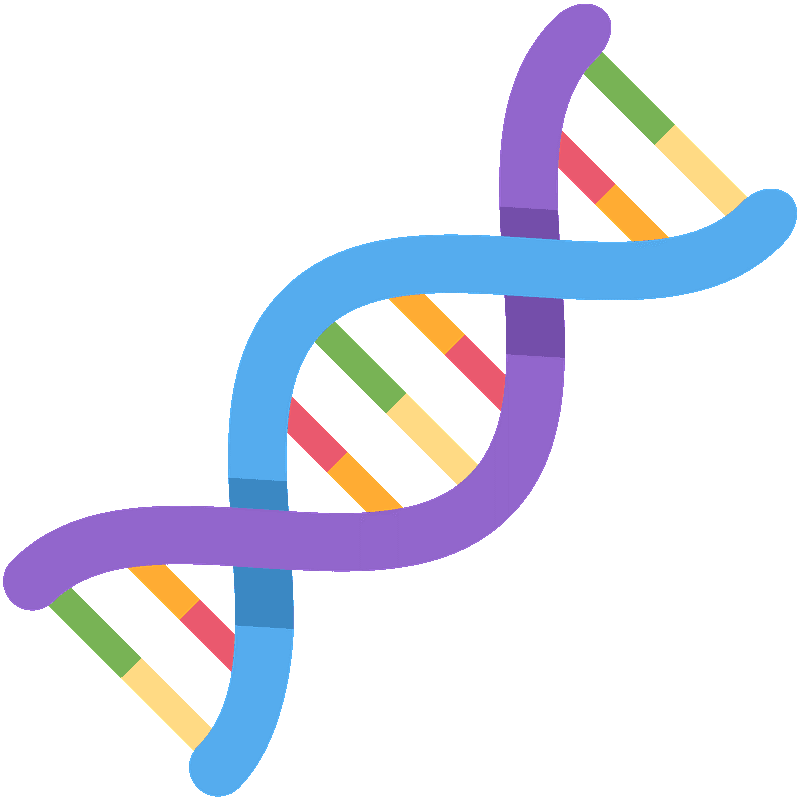Did you know that 1 in 31 (3.2%) children have autism1?

Autism is a Developmental Brain Disorder
Children with autism may learn, talk, and play in ways that are different than most children2. No two children with autism are alike. Each child has their own unique set of strengths and challenges.
Autism is a type of developmental brain disorder (DBD)2. DBDs are a group of health conditions that lead to problems with learning, talking, or playing. DBDs are caused by differences in how the brain develops4. About 1 in 6 (17%) children have a DBD5. DBDs are the most common long-term health condition in children3,5. Types of DBD often share similar symptoms3,4. It is common for children to have more than one type of DBD3,4.

Autism Fast Facts
- Autism can often be diagnosed by the age of 2 years, but many children do not receive a diagnosis until much older2.
- Autism occurs in all racial, ethnic, gender, social, and economic groups1.
- Genetic causes are found in about 1 in 3 (25-40%) children who have autism or other DBDs3.
- Early intervention services that include therapy to help a child learn, talk, and play with others can help children reach their fullest potential2.
Autism & Genetics
Both genetic and environmental factors cause differences in how the brain develops. Research shows that autism and other DBDs share genetic causes3,6,7. This means the same genetic change can lead to autism in one child and intellectual disability or another type of DBD in a different child. Specific genetic changes can lead to different types of DBD even in the same family. For example, a child’s autism could be caused by a genetic change that is also found in their parent who has mental health concerns. This research shows that there is no evidence to support a single “autism gene” or any DBD genes that only cause autism8. In fact, many genes have been found to cause autism and other DBDs. Genetic causes are found in about 1 in 3 (25-40%) of children who have autism or other DBDs3.
The American Academy of Pediatrics and the American College of Medical Genetics and Genomics recommend genetic testing for all children with autism or intellectual disability/global developmental delays as part of routine health care3,8.9. Genetic testing checks a person’s DNA for changes that could explain a specific health condition. Some genetic testing can provide other information for a person or their family members’ health3,9,11.

Potential Benefits of Genetic Testing:
- Answer the question, “why does my child have autism or other DBDs?”
- Provide information about future developmental progress
- Provide information about other health care needs
- Clarify risks of autism or other DBDs in family members or future children
- Guide families to specific resources and support
- Guide families to specific research studies and future
After receiving a diagnosis of autism or another type of DBD, children and families may have the option to pursue genetic testing. Genetic counselors work closely with specialists such as developmental pediatricians, child neurologists, child psychologists/psychiatrists, and medical geneticists to offer genetic testing. Genetic counselors provide education, coordinate genetic testing, and help families cope with having a child with special needs. Genetic testing has been useful for many families of children with autism or other DBDs. In the future, genetic testing will help doctors and researchers better understand the relationship between genetics and DBDs and improve care for children.
Jane’s Story
Jane is the mother of an 8-year-old male with a history of autism. Jane’s son was found to have a genetic change that explains his history. This same genetic change was found in Jane. Jane’s family members have up to a 1 in 2 chance (50%) of having this same genetic change. Six months after learning of this genetic change, Jane provided the following thoughts to one of our genetic counselors:
“Our family is [a] firm believer in "Knowledge is Power". After learning about our son's [deletion], we took exactly one day to be sad about it, and then we got to work. We started by updating his teachers. As parents, this news provided a bit more understanding about the "why" when our son had difficulties or struggles and made us more patient (if that was even possible!). We thought the same thing could happen with his teachers, too. This was the catalyst to the school asking if we'd like additional testing done, which we did. Therefore, when it came time to do our son's [Individualized Educational Plan], we were armed with additional data (IQ and achievement scores). I was so grateful to the school for doing the assessments so we could have a full picture of what our son's abilities are. Next, we contacted all of my siblings. We felt prepared to have the conversations based on the documents we had from [the genetic counselor]. My siblings were all understanding and supportive. It's been about 6 months, and honestly, our lives [are] the same, but more informed. Our son's medical care did not change due to the additional genetic information; however, we would be exceptionally grateful if it [had been] needed, and we found out through this process.”
|
Next Steps
- If you think your child may have autism or other concerns with the way they learn, talk, or play, speak to their doctor. Their doctor may refer you to a specialist for an evaluation. Also, call your state’s public early childhood system to request an evaluation to find out if your child is eligible for early intervention services.
- If your child has a diagnosis of autism or another DBD, genetic testing may be an option. To learn more about genetic testing you can talk with a genetic counselor. To find a genetic counselor in your area, visit https://findageneticcounselor.nsgc.org/.
- There are many ways your child can be involved in research. To learn more about research studies, visit https://autismsciencefoundation.org/get-involved/participate-in-research/.
References:
- Shaw KA, Williams S, Patrick ME, et al. Prevalence and Early Identification of Autism Spectrum Disorder Among Children Aged 4 and 8 Years — Autism and Developmental Disabilities Monitoring Network, 16 Sites, United States, 2022. MMWR Surveill Summ 2025;74(No. SS-2):1–22. DOI: http://dx.doi.org/10.15585/mmwr.ss7402a1
- Johnson, C.P. Early Clinical Characteristics of Children with Autism. In: Gupta, V.B. ed: Autistic Spectrum Disorders in Children. New York: Marcel Dekker, Inc., 2004:85-123.
- Savatt JM, Myers SM. Genetic Testing in Neurodevelopmental Disorders. Front Pediatr. 2021;9:526779. Published 2021 Feb 19. doi:10.3389/fped.2021.526779
- Moreno-De-Luca A, Myers SM, Challman TD, Moreno-De-Luca D, Evans DW, Ledbetter DH. Developmental brain dysfunction: revival and expansion of old concepts based on new genetic evidence. Lancet Neurol. 2013 Apr;12(4):406-14. doi: 10.1016/S1474-4422(13)70011-5. Epub 2013 Mar 18. Erratum in: Lancet Neurol. 2013 May;12(5):423. PMID: 23518333; PMCID: PMC4013791.
- Zablotsky B, Black LI, Maenner MJ, Schieve LA, Danielson ML, Bitsko RH, Blumberg SJ, Kogan MD, Boyle CA. Prevalence and Trends of Developmental Disabilities among Children in the US: 2009–2017. Pediatrics. 2019; 144(4):e20190811
- Ozonoff S, Young GS, Carter A, Messinger D, Yirmiya N, Zwaigenbaum L, Bryson S, Carver LJ, Constantino JN, Dobkins K, Hutman T, Iverson JM, Landa R, Rogers SJ, Sigman M, Stone WL. Recurrence risk for autism spectrum disorders: A Baby Siblings Research Consortium study. Pediatrics. 2011; 128: e488-e495
- Finucane B, Myers SM. Genetic Counseling for Autism Spectrum Disorder in an Evolving Theoretical Landscape. Curr Genet Med Rep. 2016;4:147-153. doi:10.1007/s40142-016-0099-9
- Myers SM, Challman TD, Bernier R, Bourgeron T, Chung WK, Constantino JN, Eichler EE, Jacquemont S, Miller DT, Mitchell KJ, Zoghbi HY, Martin CL, Ledbetter DH. Insufficient Evidence for "Autism-Specific" Genes. Am J Hum Genet. 2020 May 7;106(5):587-595. doi: 10.1016/j.ajhg.2020.04.004. Epub 2020 Apr 30. PMID: 32359473; PMCID: PMC7212289.
- Hyman SL, Levy SE, Myers SM; COUNCIL ON CHILDREN WITH DISABILITIES, SECTION ON DEVELOPMENTAL AND BEHAVIORAL PEDIATRICS. Identification, Evaluation, and Management of Children With Autism Spectrum Disorder. Pediatrics. 2020 Jan;145(1):e20193447. doi: 10.1542/peds.2019-3447. Epub 2019 Dec 16. PMID: 31843864.
- Manning M, Hudgins L; Professional Practice and Guidelines Committee. Array-based technology and recommendations for utilization in medical genetics practice for detection of chromosomal abnormalities. Genet Med. 2010 Nov;12(11):742-5. doi: 10.1097/GIM.0b013e3181f8baad. PMID: 20962661; PMCID: PMC3111046.
- Blesson A, Cohen JS. Genetic Counseling in Neurodevelopmental Disorders. Cold Spring Harb Perspect Med. 2020 Apr 1;10(4):a036533. doi: 10.1101/cshperspect.a036533. PMID: 31501260; PMCID: PMC7117955.
This resource was developed by Alexis Heidlebaugh, ScM; Emily Palen, MS, CGC; Rebecca Smith, MS, CGC; and Karen Wain, MS, CGC from Geisinger’s Autism & Developmental Medicine Institute.
Back to Resources 